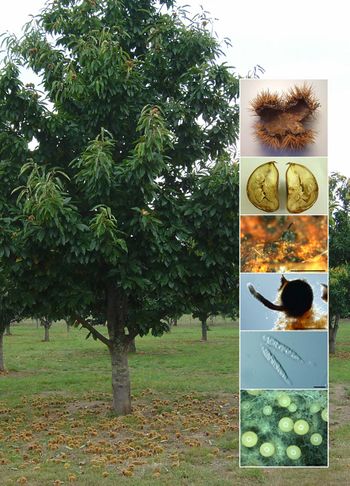Gnomoniopsis smithogilvyi
From Pestinfo-Wiki
| Literature database |
|---|
| 22 articles sorted by: |
| • year (recent ones first) |
| • research topics |
| • countries/regions |
| • host plants |

Gnomoniopsis smithogilvyi causing chestnut rot (click on image to enlarge it)
Author(s): L.A. Shuttleworth, University of Sydney, Australia
Source: Persoonia (2012) vol. 28, p. 142
Author(s): L.A. Shuttleworth, University of Sydney, Australia
Source: Persoonia (2012) vol. 28, p. 142
Gnomoniopsis smithogilvyi L.A. Shuttleworth, E.C.Y. Liew and D.I. Guest 2012 - (chestnut rot)
The fungus causes rot on chestnut (Castanea sativa) in some regions. Diseased kernels have brown spots and the fungus penetrates the endosperm and embryo of the nuts. Canker symptoms might develop on the stems and can lead to blight symptoms in young trees. Perithecia develop on dead burrs and branches of chestnut trees. They are black, globose to subglobose, around 250-400 μm in diameter, with a solitary neck. The asci are obovoid to cylindrical, hyaline and about 30 µm long and 5 µm wide and contain 8 ascospores with an average size of 7 x 2 µm, appendages are absent.
Synonyms:
Gnomoniopsis castaneae
For a review see Lione et al. (2019).